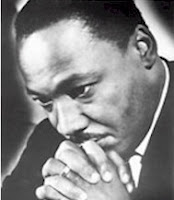By Gabriel Molina Franchossi
THE assassination of Afro-American leader Martin Luther King,
April 4, 1968 in Memphis, Tennessee 45 years ago, is considered by many
researchers as part of a sinister plot which included the assassinations of
Malcolm X, John F. and Robert Kennedy. (1)
In the stormy decade of the 1960’s, the radicalization of those in favor of civil rights, peace and other popular causes had the United States in flames. Two months after MLK’s death, Senator Robert Kennedy was shot. The world had been shocked previously by the November 22, 1963 assassination of President Kennedy and that of Malcolm X on February 21, 1965.
King and Malcolm had challenged the racial segregation which replaced slavery in the United States, abolished by Lincoln during the Civil War. The country’s founding fathers had protected the enslavement of Blacks with a strict legal system of racial separation.
Blacks were crowded into impoverished ghettos and denied access to public facilities reserved for whites, such as transportation, bathrooms, commercial establishments and schools. They were destined to work in the most difficult, low-paying jobs. Afro-Americans’ very limited right to vote guaranteed the stability of the system.
An example of the racism faced by Blacks in southern states occurred on October 19, 1960, when Reverend King was arrested in Atlanta, Georgia, for refusing to leave a department store where he was denied service. A few months earlier in Dekalb County, he had been convicted of a minor traffic offense and given a suspended sentence. The local judge ruled that his arrest in Atlanta provided just cause to revoke this suspension and sentence King to four months of hard labor.
The sentence aroused fear for the Reverend’s life, given what such a punishment meant for Blacks in Atlanta. King was brusquely awakened in his county jail cell, at 4:30 am. With his hands cuffed and legs restrained, he was transported over dark rural roads to a penitentiary deep within Georgia’s countryside. (2)
Georgia Governor Ernest Vandiver received a request to revoke the sentence from John F. Kennedy, a Presidential candidate at the time. His response was that such a move would be politically disastrous in the South, just a month before the elections, asserting that it would mean the loss of at least three states. Robert Kennedy called the judge, who at first criticized the intervention, but the next day, after considering the younger Kennedy’s indignant reaction to the sentence, freed Dr. King.
Committed Black leaders took the lead in the movement against segregation, which employed a variety of resistance tactics, such as sit-ins in public White Only facilities and buses, as well as boycotts of stores and theaters. With new laws supported by the Kennedy’s in place, the struggle intensified. The federal government sent in the National Guard and Federal Marshals to protect King, James Meredith and other leaders when the civil rights movement’s peaceful activists were threatened and beaten by police in states where change was violently opposed.
King and Malcolm X, in particular, became targets, not only of racists but of the national military-industrial complex when the Black and trade union struggle began to radicalize and organize against the war in Vietnam, as was made evident by the 250,000 strong march in Washington where King gave his famous ‘I have a dream’ speech.
This process also had an effect on the Kennedy brothers, whose support for civil rights legislation distanced them from the powerful elite established within the CIA and FBI. J. Edgar Hoover, director of the FBI, told Atlanta Police Chief Herbert Jenkins that two of the three enemies he most hated were Kennedy and King (3). Robert Kennedy considered Hoover a threat to democracy in the country.
Allen Dulles, head of the Central Intelligence Agency, was so intent on organizing interventions in Cuba and throughout the Third World that Kennedy decided to replace him.
The close surveillance of the four leaders – King, Malcolm X and the two Kennedy brothers – expanded to include persecution and threats which make Dulles and Hoover prime suspects in the four assassinations. They had a motive, the opportunity and the means.
In the stormy decade of the 1960’s, the radicalization of those in favor of civil rights, peace and other popular causes had the United States in flames. Two months after MLK’s death, Senator Robert Kennedy was shot. The world had been shocked previously by the November 22, 1963 assassination of President Kennedy and that of Malcolm X on February 21, 1965.
King and Malcolm had challenged the racial segregation which replaced slavery in the United States, abolished by Lincoln during the Civil War. The country’s founding fathers had protected the enslavement of Blacks with a strict legal system of racial separation.
Blacks were crowded into impoverished ghettos and denied access to public facilities reserved for whites, such as transportation, bathrooms, commercial establishments and schools. They were destined to work in the most difficult, low-paying jobs. Afro-Americans’ very limited right to vote guaranteed the stability of the system.
An example of the racism faced by Blacks in southern states occurred on October 19, 1960, when Reverend King was arrested in Atlanta, Georgia, for refusing to leave a department store where he was denied service. A few months earlier in Dekalb County, he had been convicted of a minor traffic offense and given a suspended sentence. The local judge ruled that his arrest in Atlanta provided just cause to revoke this suspension and sentence King to four months of hard labor.
The sentence aroused fear for the Reverend’s life, given what such a punishment meant for Blacks in Atlanta. King was brusquely awakened in his county jail cell, at 4:30 am. With his hands cuffed and legs restrained, he was transported over dark rural roads to a penitentiary deep within Georgia’s countryside. (2)
Georgia Governor Ernest Vandiver received a request to revoke the sentence from John F. Kennedy, a Presidential candidate at the time. His response was that such a move would be politically disastrous in the South, just a month before the elections, asserting that it would mean the loss of at least three states. Robert Kennedy called the judge, who at first criticized the intervention, but the next day, after considering the younger Kennedy’s indignant reaction to the sentence, freed Dr. King.
Committed Black leaders took the lead in the movement against segregation, which employed a variety of resistance tactics, such as sit-ins in public White Only facilities and buses, as well as boycotts of stores and theaters. With new laws supported by the Kennedy’s in place, the struggle intensified. The federal government sent in the National Guard and Federal Marshals to protect King, James Meredith and other leaders when the civil rights movement’s peaceful activists were threatened and beaten by police in states where change was violently opposed.
King and Malcolm X, in particular, became targets, not only of racists but of the national military-industrial complex when the Black and trade union struggle began to radicalize and organize against the war in Vietnam, as was made evident by the 250,000 strong march in Washington where King gave his famous ‘I have a dream’ speech.
This process also had an effect on the Kennedy brothers, whose support for civil rights legislation distanced them from the powerful elite established within the CIA and FBI. J. Edgar Hoover, director of the FBI, told Atlanta Police Chief Herbert Jenkins that two of the three enemies he most hated were Kennedy and King (3). Robert Kennedy considered Hoover a threat to democracy in the country.
Allen Dulles, head of the Central Intelligence Agency, was so intent on organizing interventions in Cuba and throughout the Third World that Kennedy decided to replace him.
The close surveillance of the four leaders – King, Malcolm X and the two Kennedy brothers – expanded to include persecution and threats which make Dulles and Hoover prime suspects in the four assassinations. They had a motive, the opportunity and the means.
(1) James W. Douglass. JFK and the Unspeakable. Simon and Shuster,
p. XVII
(2) Arthur Schlesinger. Robert Kennedy and his Times. Random House 1978, p. 233
(3) Ibid, p.280
April 10, 2013
(2) Arthur Schlesinger. Robert Kennedy and his Times. Random House 1978, p. 233
(3) Ibid, p.280
April 10, 2013


